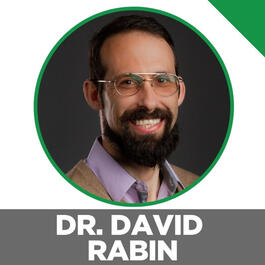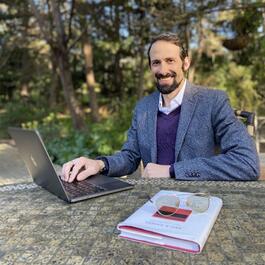
A Whole New Way To Deal With Stress, Trauma & PTSD In Just Seconds: The First Clinically Validated Wearable That Helps You De-Stress, Focus, Sleep, Stay Energized & Remain Calm.
Dr. David Rabin, MD, PhD is a guy who designed a fascinating wearable that he showed me a few weeks ago when he came to my house in Spokane, WA. A board-certified psychiatrist, translational neuroscientist, and inventor specializing in the treatment of post-traumatic stress disorder (PTSD), depression, anxiety, and substance use disorders, Dr. Rabin has spent the last 14 years researching treatments to combat the negative effects of chronic stress on physical and mental health. He received his MD in medicine and his PhD in neuroscience from Albany Medical College and trained in psychiatry at Western Psychiatric Institute & Clinic at the University of Pittsburgh Medical Center. Dr. Rabin helped to organize the world’s largest controlled study of psychedelic medicines in collaboration with colleagues at Yale, the University of Southern California, Mt. Sinai, Modern Spirit, and MAPS (Multidisciplinary Association of Psychedelic Studies) to determine the mechanisms of the dramatic therapeutic benefits observed following psychedelic-assisted psychotherapy in treatment-resistant mental illness. The study has begun and is collecting DNA samples from patients with treatment-resistant PTSD who are participating in the MAPS-sponsored Phase 3 FDA trial of MDMA-assisted psychotherapy to evaluate the gene expression changes that result from the therapy. He is also the founder and executive director of the Board of Medicine, a nonprofit organization of physicians and scientists spearheading the development of the world’s first evidence-based peer-reviewed clinical guidelines for the safe use of complementary and alternative medicines including medical cannabis. Dr. Rabin works with patients with treatment-resistant conditions like post-traumatic stress disorder (PTSD), depression, and substance use disorders. In his work, he found that when patients were in a calm, safe environment their physiological markers of stress improved, their mood got better, and they were better able to focus and manage their symptoms. He also found that mindfulness techniques and deep breathing worked quite well to reduce stress in patients, but that his patients had a difficult time practicing these techniques on their own in their day-to-day lives. In 2014, Dr. Rabin began his research on what would become the device I'm referring to, "Apollo" in a neuroscience lab at the University of Pittsburgh. After exploring academic research on mindfulness, biofeedback, deep breathing, and a host of sensory techniques including music therapy, Dr. Rabin found that touch is an often overlooked, but an incredibly vital pathway for quickly establishing relaxation in the mind and in the body. He quickly got to work developing Apollo, a breakthrough wearable technology that uses the neuroscience of touch and vibration to combat the negative effects of stress during his research at the University of Pittsburgh. Apollo sends gentle waves of vibration to your body that are clinically shown to bring your heart, lungs, and mind into balance, resulting in improved heart rate variability (HRV). By signaling safety to the body through your sense of touch, Apollo offers you control over your stress, so you can tackle whatever comes next. After clinical trials of the Apollo technology demonstrating its reliable effects on mood, sleep, and focus, Dr. Rabin co-founded Apollo Neuroscience to make the discovery available to the public. Chronic stress tells your body that you’re under threat. These consistent disturbances put your body into fight-or-flight, making it difficult to stay calm, focus your attention, and get good sleep. Apollo’s vibrations work by signaling safety to the brain, thereby soothing the stress response and rapidly restoring balance to the body. Apollo Neuroscience has created the first wearable system that upgrades your body instead of just tracking it. Clinical studies show that Apollo increases physical endurance, mental performance under stress, access to meditative states, and helps users reach relaxation before bed rapidly by improving heart rate variability (HRV). Apollo’s effects occur within 5 minutes of use and have no known side effects. Apollo’s AI mobile app delivers gentle layered vibration frequencies to the body via a small modular wearable worn on the ankle or wrist. Users will be able to connect Apollo’s mobile app to Apple Health Kit to see how their biometrics improve with Apollo use over time. The Apollo system has been tested and independently validated by individual members of a number of different institutions in the military and many Veterans, several academics at Universities, >10 elite athletics clubs, as well as in two University clinical trials with 6 more trials currently underway. The Company has over 1500 beta testers and has conducted over 500 long-term case studies with consistent results. Positive symptom improvements and voluntary reductions in habit-forming substances such as opioid narcotics, benzodiazepines, amphetamines, and caffeine have been reported in those with chronic conditions worsened by stress including insomnia, chronic pain, and PTSD. The most recently completed trial of Apollo at the University of Pittsburgh comparing EEG patterns of 25 naive meditators to 25 experienced meditators demonstrated that Apollo frequencies made naive meditators’ brainwaves look nearly identical to those of experienced meditators within 12 minutes. Apollo is currently being studied in a 100-subject PTSD trial between the University of Pittsburgh and the New School (NYC) with an FDA trial for PTSD at the Pittsburgh VA Hospital in planning for Winter 2020. All studies and trials of the Apollo technology have been supported entirely with non-dilutive funding and grants. The Apollo system has been developed to FDA ISO 13485 regulatory requirements and HIPAA Compliance. During this discussion, you'll discover: -The link between the natural need to feel safe and stress...11:45 Autonomic balance: Understanding the link between the sympathetic and parasympathetic nervous systems is key Safety and threat are two major stimulants to the nervous system Safety to the parasympathetic Threat to the sympathetic Both natural instincts for self-preservation (diverting energy for the situation) Downsides of constantly being in sympathetic state Affects fertility and libido Athletes experience loss of libido during training Corporate burnout is considered a physical condition due to constantly being in a state of stress (sympathetic system) Preschoolers are often prescribed antidepressants due to stressors in their environment The human body is not meant to tolerate the stressors of modernity The body may be under a lot of stress even if we feel safe (roof over our head, food in the fridge, etc.) -How trauma affects one's ability to feel safe...23:30 "Trauma" by definition may be more far-reaching than one may think Safety includes, but is not limited to the physical element Trauma is one or many meaningful or intense unsafe experiences over time Parents ignore multiple times Perceptions of being unlovable or cannot love others Constantly worried about finances Affects the parasympathetic nervous system Book: Top 5 Regrets of the Dying by Bronnie Ware More connected w/ friends Worked less Choose to be happier Courage to express true self Courage to be who I am rather than who people expected me to be Dr. Gabor Maté Trauma is a disconnection from self Sanskrit word for "self" is synonymous with "health" Breathwork and meditation (Telling your body you have time to breathe and relax) You must let go of attachment to things in the past in order to present to the world your true self -Whether or not epigenetic trauma is a legit concept...34:55 At one time a theory, now well-established in the scientific field Rachel Yehuda: "How Trauma and Resilience Cross Generations" Dutch potato famine: descendants experienced similar symptoms (depression, obesity, schizophrenia, etc.) NYT Article: Can We Really Inherit Trauma? The Famine Ended 70 Years Ago, but Dutch Genes Still Bear Scars -How psychedelics are used to reverse trauma...45:00 Psilocybin and ayahuasca: Used traditionally to release trauma Are being used to reverse trauma Highly efficacious while used w/ MAPS therapy on PTSD patients Psychedelics are for "mind-manifesting"; not a party drug Ketamine is the only legal psychedelic in the U.S. (MDMA, psilocybin expected to clear hurdles soon) BGF podcast with Dr. Matthew Cook about ketamine MDMA Journey by Tucker Max Everyone has trauma; they're all manifesting in different ways Depression Schizophrenia Anxiety Apollo to be used (eventually) after MDMA is administered We don't heal because of the medicine; the medicine empowers the body's innate ability to heal itself Breath is the gateway to the spirit Apollo was created to replicate the effects of expensive MDMA treatments with much more accessibility -The technology behind the Apollo Neuroscience wearable...1:01:25 Gentle vibrations to the body (like an ocean wave, or cat purring on you) Touch is the most effective means of creating the feeling of safety Made up of sound frequencies Skin perceives it much more than the ear Music changes resonance patterns in our bodies in different settings (working out, meditating, etc.) The 7 states in the device: Wakefulness (first thing in the morning) Clear and focused (for long deep work, public speaking, etc.) Rebuild and recover Social and open (social safety and flow, need to be "on") Meditation Relax and recharge Sleep Amount of time you'll use the device are case-dependent It becomes more effective over time; the body becomes sensitized to it -What the Apollo is made of...1:11:40 Built to FDA specs Hypo-allergenic Only active w/ Bluetooth when using the app (very low EMF exposure) HIPAA compliant -Rapid-fire questions about the Apollo...1:15:55 Is it safe for children and the elderly? Yes, it's been tested successfully on ages 3-93 Can it work on any part of the body? Yes, provided you adjust the settings appropriately Is it currently available to the general public? Yes. Click here to get the Apollo (use code BENGREENFIELD15 to get a 15% discount) -And much more... Resources from this episode: - The Apollo wearable (use code BENGREENFIELD15 to get a 15% discount) - BGF podcast w/ Dr. Matt Cook on how Ketamine works - The Top Five Regrets of the Dying: A Life Transformed by the Dearly Departing - How Trauma and Resilience Cross Generations - NYT Article: Can We Really Inherit Trauma? - Dr. Gabor Maté website - The Famine Ended 70 Years Ago, but Dutch Genes Still Bear Scars - MDMA Journey by Tucker Max - BGF podcast with Dr. Matthew Cook about ketamine - The Renegade Pharmacist SOMA breathwork routine that includes the holotropic routine I do Episode sponsors: -Kion Lean: Support for normal blood sugar levels and healthy energy metabolism, even after large, carb-rich meals. Ben Greenfield Fitness listeners, receive a 10% discount off your entire order when you use discount code: BGF10. -Organifi Red Juice: Enjoy all the benefits of the 11 superfoods and their micronutrients that help increase resting metabolism, support cardiovascular health, and remove toxins to turn back the hands of time! Receive a 20% discount on your entire order when you use discount code: BENG20 -ButcherBox: Delivers healthy 100% grass-fed and finished beef, free-range organic chicken, and heritage breed pork directly to your door on a monthly basis. All their products are humanely raised and NEVER given antibiotics or hormones. For 2 lbs of 100% grass-fed beef and 2 lbs of pure bacon for FREE, PLUS $20 off your first box enter promo code: BEN20 at checkout. -Thrive Market: Organic brands you love, for less. Your favorite organic food and products. Fast and free shipping to your doorstep. Receive a gift card up to $20 when you begin a new membership using my link. Do you have questions, thoughts or feedback for Dr. David Rabin or me? Leave your comments below and one of us will reply! See omnystudio.com/listener for privacy information.
From "Boundless Life"




Comments
Add comment Feedback